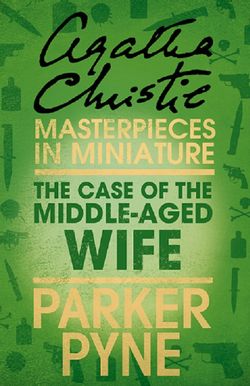Читать книгу The Case of the Middle-Aged Wife: An Agatha Christie Short Story - Агата Кристи, Agatha Christie, Detection Club The - Страница 5
ОглавлениеThe Case of the Middle-Aged Wife
‘The Case of the Middle-Aged Wife’ was first published as ‘The Woman Concerned’ in Woman’s Pictorial, 8 October 1932.
Four grunts, an indignant voice asking why nobody could leave a hat alone, a slammed door, and Mr Packington had departed to catch the eight forty-five to the city. Mrs Packington sat on at the breakfast table. Her face was flushed, her lips were pursed, and the only reason she was not crying was that at the last minute anger had taken the place of grief. ‘I won’t stand it,’ said Mrs Packington. ‘I won’t stand it!’ She remained for some moments brooding, and then murmured: ‘The minx. Nasty sly little cat! How George can be such a fool!’
Anger faded; grief came back. Tears came into Mrs Packington’s eyes and rolled slowly down her middle-aged cheeks. ‘It’s all very well to say I won’t stand it, but what can I do?’
Suddenly she felt alone, helpless, utterly forlorn. Slowly she took up the morning paper and read, not for the first time, an advertisement on the front page.
‘Absurd!’ said Mrs Packington. ‘Utterly absurd.’ Then: ‘After all, I might just see …’
Which explains why at eleven o’clock Mrs Packington, a little nervous, was being shown into Mr Parker Pyne’s private office.
As has been said, Mrs Packington was nervous, but somehow or other, the mere sight of Mr Parker Pyne brought a feeling of reassurance. He was large, not to say fat; he had a bald head of noble proportions, strong glasses, and little twinkling eyes.
‘Pray sit down,’ said Mr Parker Pyne. ‘You have come in answer to my advertisement?’ he added helpfully.
‘Yes,’ said Mrs Packington, and stopped there.
‘And you are not happy,’ said Mr Parker Pyne in a cheerful, matter-of-fact voice. ‘Very few people are. You would really be surprised if you knew how few people are happy.’
‘Indeed?’ said Mrs Packington, not feeling, however, that it mattered whether other people were unhappy or not.
‘Not interesting to you, I know,’ said Mr Parker Pyne, ‘but very interesting to me. You see, for thirty-five years of my life I have been engaged in the compiling of statistics in a government office. Now I have retired, and it has occurred to me to use the experience I have gained in a novel fashion. It is all so simple. Unhappiness can be classified under five main heads – no more, I assure you. Once you know the cause of a malady, the remedy should not be impossible.
‘I stand in the place of the doctor. The doctor first diagnoses the patient’s disorder, then he proceeds to recommend a course of treatment. There are cases where no treatment can be of avail. If that is so, I say frankly that I can do nothing. But I assure you, Mrs Packington, that if I undertake a case, the cure is practically guaranteed.’
Could it be so? Was this nonsense, or could it, perhaps be true? Mrs Packington gazed at him hopefully.
‘Shall we diagnose your case?’ said Mr Parker Pyne, smiling. He leaned back in his chair and brought the tips of his fingers together. ‘The trouble concerns your husband. You have had, on the whole, a happy married life. You husband has, I think, prospered. I think there is a young lady concerned in the case – perhaps a young lady in your husband’s office.’
‘A typist,’ said Mrs Packington. ‘A nasty made-up little minx, all lipstick and silk stockings and curls.’ The words rushed from her.
Mr Parker Pyne nodded in a soothing manner. ‘There is no real harm in it – that is your husband’s phrase, I have no doubt.’
‘His very words.’
‘Why, therefore, should he not enjoy a pure friendship with this young lady, and be able to bring a little brightness, a little pleasure, into her dull existence? Poor child, she has so little fun. Those, I imagine, are his sentiments.’
Mrs Packington nodded with vigour. ‘Humbug – all humbug! He takes her on the river – I’m fond of going on the river myself, but five or six years ago he said it interfered with his golf. But he can give up golf for her. I like the theatre – George has always said he’s too tired to go out at night. Now he takes her out to dance – dance! And comes back at three in the morning. I – I –’
‘And doubtless he deplores the fact that women are so jealous, so unreasonably jealous when there is absolutely no cause for jealousy?’
Again Mrs Packington nodded. ‘That’s it.’ She asked sharply: ‘How do you know all this?’
